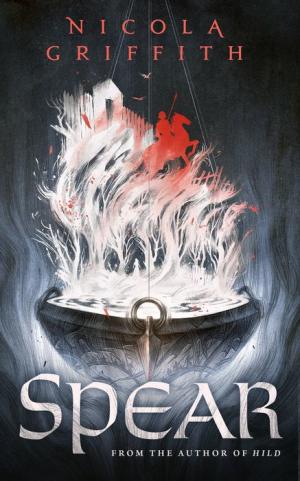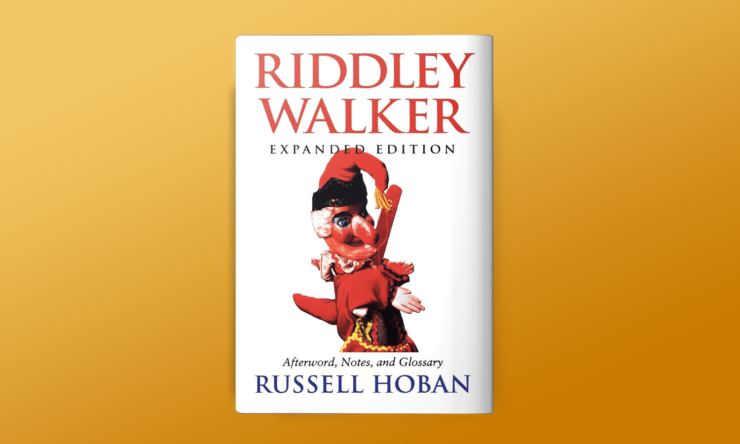I don’t recommend my favorite book, Russell Hoban’s Riddley Walker, without a lot of caveats. People have gotten mad at me—legitimately mad—when they’ve heard me say “this is my favorite book” and interpreted that as “you should read it” even though I never said so, and then the first sentence is “On my naming day when I come 12 I gone front spear and kilt a wyld boar he parbly ben the las wyld pig on the Bundel Downs any how there hadnt ben none for a long time befor him nor I aint looking to see none agen.”
If you aren’t prepared for that sort of thing—and Riddley Walker, while very much a classic, also isn’t nearly as well-known as I think it deserves—it’s not unreasonable to be like “Jess what the fuck.”
So I try to make sure that people understand that this is a book about a young boy’s quest through a post-apocalyptic world in which civilization has been all but destroyed and then gradually, over hundreds or thousands of years, clawed its way back to approximately the Bronze Age—and like many other books I love or have loved (A Clockwork Orange, The Faerie Queene), it is written in a fictionalized English appropriate to the fictionalized England it wants to evoke.
Now that that’s out of the way: it’s my favorite book in the world and you should probably read it. Because yes, you have to essentially learn a new language or at least a new dialect to understand what’s going on, but every single part of that dialect is a deeply-considered commentary on how we remember, forget, and reframe our distant past—and, in the process, often badly distort not only the past but the future.
Not all of the word mutations are especially load-bearing, but all of them change the way you think about the palimpsest of older language and culture that underpins modernity. Take, for instance, the town Widder’s Bel (“widder” is widow in Riddley’s language). Once you understand how this post-post-post-apocalyptic landscape maps onto the U.K. county of Kent, it’s clear that this is the town we now know as Whitstable. But Whitstable was previously Witestaple or Witenestaple, “white post” (from the Old English hwit) or “wise man’s post” (from the Old English wita). Our modern English plucked nonsense from a meaningful word—whit stable, like a tiny place to keep horses? What?—and Riddley’s compatriots have put meaning back, combining the familiar concept bell and the probably even more familiar concept widow.
The most interesting erasures and re-inscriptions in Riddley’s world are biggies: science, religion. The loss, attempted recreation, and ultimate tragedy of certain scientific capabilities—which turn out to be inextricable from destruction—drive the plot. But the novel’s biggest moments of epiphany are animated by old religious (and misappropriated non-religious) artifacts that have been divorced from their contexts and scrambled into a kind of scriptural-historical pastiche. These are revelatory moments for Riddley and also, separately, for the reader: he experiences something he understands as enlightenment, and we, with a clearer understanding of these decontextualized images, understand a little more.
I love these moments for what they tell us about our unconquerable hunger both for cultural amnesia and for pattern-finding and mythmaking: we destroy the past, and then use the shards to create an imagined history. But I also love that Riddley’s patchwork dogma, built out of fragments of religion and art and language that survived the flood of disaster, has never gotten around to recreating the concept of God.
Buy the Book


Spear
It would spoil the story to detail some of the ways that the unspecified apocalypse in Riddley Walker has digested deistic religion and spat out the godless bones. But it wouldn’t spoil anything to talk about the one line I think most beautifully epitomizes what Riddley’s language tells us about the parallel evolution of words, thoughts, and beliefs. Early in the book, only four very short chapters in, we’re introduced to a hymn that’s survived from our near future to Riddley’s very far one. To the reader, it’s very clearly a Christian hymn, but written at a time when space travel was routine. Here’s how it goes:
Pas the sarvering gallack seas and flaming nebyul eye
Power us beyont the farthes reaches of the sky
Thine the han what shapit the black
Guyd us there and guyd us back
That’s all in Riddley’s dialect, but many of the words don’t appear anywhere else in the book, because the concepts they represent—sovereign galaxies, flaming nebulae—are meaningless in Riddley’s time. The hymn itself rode some kind of cultural ark into the future, but like many of our modern hymns, its referents are all but lost. (How many average churchgoers can really unpack “trampling out the vintage where the grapes of wrath are stored”?) But what’s interesting to me is the word that does show up again immediately after the song: “Straiter Empy said, ‘Thine hans for Brooder Walker.’ We all thinet hans then round the fire.” We all did what around the fire? We thined hands.
Did you get what happened there? At some point, the post-apocalyptic, neo-primitive culture in which Riddley lives heard the phrase “thine the hand”—for us, clearly a reference to a Christian God, using an obsolete pronoun which has hitched its way into our present in a specifically religious context just as this hymn did for Riddley—and, lacking context for both the meaning of “thine” and who the “thou” might be, came to the reasonable conclusion that it must be something you do with hands. From there it’s an easy leap: obviously if you “thine” hands with someone else it means you entwine them, because that’s what it sounds like that would mean. And so, as part of the ritual, you thine hands, and later unthine them.
As a person who is fascinated by language and also has no connection to theism, how freaking much do I love this! This single half-page is actually full of similarly perfect illustrations of how we struggle to fit the unfamiliar into our mental framework—see also “well, I don’t know what a galaxies or nebulae are but I know what seas and eyes are so I guess they’re a kind of sea and a kind of eye”—but “we all thinet hands” is the line I’ll bang on about if I’m drunk and you get me started about this book. If you don’t like it, you won’t like Riddley Walker. Like I said, that’s fine; it’s not for everyone, and I said as much, so you’re not allowed to get mad. For those who do, though—I find this example especially exquisite, but the language and world that Hoban created is studded with gems like this. If you’re excited by this, and you haven’t read Riddley Walker yet: don’t Riddley walk, Riddley run.
Jess Zimmerman is an an editor at Quirk Books and previously the editor-in-chief of Electric Literature. Her essays, fiction, opinion pieces, and prose poetry have appeared in publications such as Slate, The Cut, The Guardian, Catapult, Hazlitt, and The New Republic. She lives in Brooklyn.










